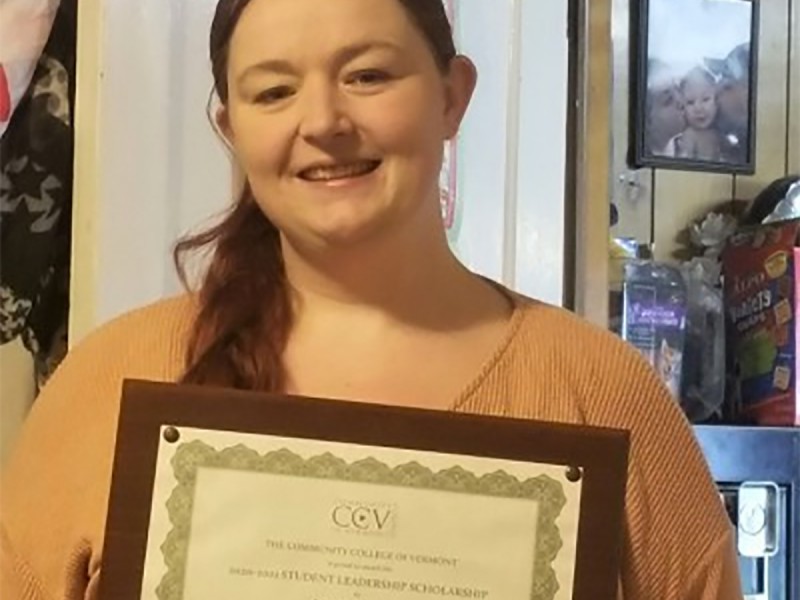
At CCV, we are here to help you cover the cost of college. That’s why we encourage every student to complete the Free Application for Federal Student Aid (FAFSA) and the Vermont Grant Application. Completing these steps will help our financial aid team identify the funding sources you’re eligible for.
Tuition
Tuition for Academic Year 2025-2026
In-State = $290/credit
Out-of State = $580/credit
NEBHE/Good Neighbor* = $290/credit
Academic Year 2024 – 2025
In-State = $280/credit
Out-of State = $560/credit
NEBHE/Good Neighbor* = $280/credit
Fees
Academic Year 2024 – 2025
Administrative (non-refundable) – $100
Independent Study – $80
Field Experience – $80
Textbooks – varies by course
Course-Specific Fees – vary (check the Course Schedule for info)
Non-Credit Workshops – vary (check the Course Schedule for info)
Assessment of Prior Learning portfolio evaluation – $300
Course Challenge – $290
Competency Based Pathway – $150
Focused Portfolio Development portfolio evaluation – $200
Evaluation of Transcripts from Other Colleges – Free
*Applies to students who are permanent residents of and living in counties bordering Vermont. (Cheshire, Sullivan, Grafton, and Coos counties in New Hampshire, Franklin and Berkshire counties in Massachusetts, and Clinton, Essex, Rensselaer, and Washington counties in New York). Students may also be eligible if they are enrolled in a New England Board of Higher Education (NEBHE) approved program that is not available in their home New England state (not including New York).
Earn a Tuition-Free Degree
The 802 Opportunity Grant provides tuition- and fee-FREE college to any student in a degree program whose family income is $100,000 or less and does not already have a bachelor’s degree. Students will be required to complete a FAFSA and Vermont Grant Application through VSAC. New AND current students are eligible.
Tuition Calculator
Use our tuition calculator to get an idea of how much you may pay in tuition and fees. For a more comprehensive estimate that includes things like books and course fees, use our Net Price Calculator. The Net Price Calculator will ask you for your residency status and the number of credits you’d like to take. It can also estimate your financial aid eligibility!
Cost of Attendance
Federal regulations require CCV to provide estimated costs for a student while they are attending CCV. These costs are not all charged by CCV and some students may not have these expenses. These estimated costs are called the Cost of Attendance.
Cost of Attendance has two parts:
Direct costs: These are things that CCV charges you. This usually includes tuition and fees.
Indirect costs: These are things that you may have to pay for while you are attending CCV. They are NOT charged by CCV but they are still things you may pay for while attending. This includes housing, food, books and supplies, transportation, and personal expenses.
Your direct costs are above. Below are what you MAY have for indirect costs. Not every student has these expenses, and they reflect, based upon research, what a typical Vermonter may pay over a 9 month period.
Estimated Costs, 2024-2025 academic year
| Estimated Housing | $9,972 |
| Estimated Food | $4,275 |
| Estimated Books, Supplies, and Course Materials | $1,000 |
| Estimated Transportation | $1,800 |
| Estimated Personal Expenses | $4,500 |
| Estimated Total Costs | $21,547 |
Special or Unusual Circumstances
Our estimated expenses try to provide what is an average cost for a Vermont family. But, families may have additional costs not factored into our estimates. Students have the ability to submit an appeal to help financial aid understand those additional costs.
Other allowances that can be added to the Cost of Attendance include course fees related to specific courses, computer allowance, cost of obtaining licensure, study abroad expenses, dependent care expenses, disability related expenses, cooperative education cost, or fees from federal education loans. Allowances may be pro-rated based on enrollment. If expenses exceed the numbers in the Cost of Attendance, a student has the ability to submit an appeal. Students may talk with their financial aid counselor to learn more details about the appeal.
Auditing a Class
Students may register to “audit” CCV classes for which they are academically prepared. The cost is the same as when taking the course for credit; however, students will not receive an evaluation, course grade, or credit for the course. Audit status must be declared at time of enrollment. View our Course Audit Policy.
Residency Requirements for In-State Tuition
In-state tuition rates apply to students who have maintained legal residence in Vermont for at least one continuous year prior to enrollment. Out-of-state students seeking in-state status must submit a completed In-State Tuition Application, and supporting evidence, to be considered for in-state tuition. As part of the Vermont State Colleges System, CCV follows the Vermont State Colleges’ Residency Policy. To apply for in-state tuition, use the In-state Tuition Application Form.
NEBHE and Good Neighbor Tuition Break Program
Permanent residents of other New England states may be eligible for the New England Board of Higher Education (NEBHE) Tuition Break Program which allows them to pay a special tuition rate that is equivalent to the current in-state rate. To qualify, a student must be a permanent resident of and living in a bordering New Hampshire or Massachusetts county (Cheshire, Sullivan, Grafton, and Coos counties in New Hampshire, and Franklin and Berkshire counties in Massachusetts). Students may also be eligible if they are enrolled in a NEBHE approved degree or certificate program that is not available in their home New England state.
CCV’s Good Neighbor program allows New York residents living in Clinton, Essex, Rensselaer, and Washington counties to also receive a discount that makes their tuition equal to the current in-state tuition rate.
For questions about residency for in-state tuition or the NEBHE Tuition Break Program, please contact Karrie DeMers, admissions specialist, at karrie.demers@ccv.edu or 802-654-0557.
Veteran and Military-Connected Students
Active duty and recently discharged (in the last three years) military personnel (as well as the spouses and dependents of such military service members) who don’t otherwise qualify for in-state status may be eligible based on their military service. To be considered, please complete the In-state Tuition Application Form and include documentation such as the following:
- Proof of active military status or recent discharge. This can include such items as:
- Current military orders of applicable service member
- DD214 with an honorable discharge dated within the past 3 years
- NGB22 with an honorable discharge dated within the past 3 years (National Guard)
- DD256 with an honorable discharge dated within the past 3 years (Reservist)
- (For Spouses) Proof of Marriage (Marriage License, Federal tax filings showing married status, etc.)
- (For Dependents) Proof of Dependency (Federal tax filings showing dependent status, etc.)



